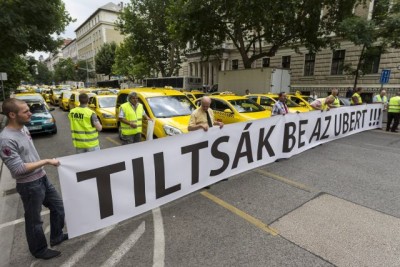As it has happened in many countries before, Hungarian taxi drivers have had enough of Uber, and protested in the most busy junctions of Budapest for days. And although the conflict is more of an economic issue than a political one, the reactions of the Hungarian government and opposition parties are worth looking at closer.
Let’s imagine what would happen if an application threatened the monopoly of not the taxi drivers but the tobacco shop owners (Hungarians connected to governing Fidesz party with exclusive state concession to sell tobacco since 2013.) If an application could find a way to sell tobacco directly to the consumers – excluding the middlemen. Cheaper than them. It would certainly not remain without a reaction from the government.
The answer wouldn’t just be more rigorous rules, but banning the application right away. They would ‘just solve it’ – as the taxi drivers demanded in the case of Uber. The government would “ask” the question in an overwhelming communication campaign, or so-called national consultancy: “Do you agree with the fact that the Hungarian taxpayer’s money should go to decent Hungarian citizens instead of billionaires in California?” American influence, George Soros, Angela Merkel and Brussels would be also mentioned in the justifications of the banning – all with a bad connotation, as the enemies of decent Hungarians, of course. It would probably somehow turn out that the application was invented by migrants.

Originally published at www.privatbankar.hu
It is not the case though: the Hungarian government seems to try to negotiate and find a solution. It doesn’t play the independent middle-man between employers and employees, but it is closer to that than in any conflict in the past years. This is the first political lesson of the Hungarian Uber-case: it disproved both generalizations – that the Hungarian government is generally against multinational corporations (which is the interpretation of the left-liberal opposition), but it’s not true either that it tries to enforce their interests – an accusation from other, protectionist, more radical opposition parties. The economic policy of the Hungarian government is based mainly on political reasons: it can act as a friend of multinational corporations (MNC-s) if it comes to building a new factory of a car manufacturer in Hungary, but also as the enemy of MNC-s, when it comes to supporting and protecting some Hungarian FMCG company (closely related to Fidesz).
The second lesson shows the difficulties and contradictions of the Hungarian left-liberal opposition. They seem to have very similar opinion in general, but if you look closely, you’ll see their politicians and intellectuals constantly fighting on minor differences in certain issues. Just like the Uber-case: the leftist parties (like the socialists) are more in favour of Uber, and a representative of the new, more liberal party (Együtt) made the most anti-Uber statement in the debate. This shows quite well that although the frontlines are very clear when it comes to democracy, rule of law, European orientation – it is not the case in economic issues. Opposition parties have to remember this when creating a program and looking for alternatives instead of the regime of Fidesz: the Hungarian opposition is not right of left wing, rather eclectic – just like the government.
And last but not least: the most important and positive lesson learned from the Uber-case was the perception that in a certain issue the majority of the Hungarian society were the more free-market oriented, pro-capitalist individuals. Young Hungarians seem not to be afraid or reject capitalism in general – simply the Eastern European version of it. The Uber case might then prove that capitalism can be different too.



